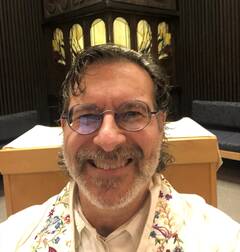April 2022
03/30/2022 08:49:55 AM
| Author | |
| Date Added | |
| Automatically create summary | |
| Summary |
 NOTE: While this occurred in February at the beginning of this war, it is an important story that we must never forget.
NOTE: While this occurred in February at the beginning of this war, it is an important story that we must never forget.
On March 6, I had the honor—along with 962 other people—to sit in on a Zoom call and hear the first-person account of a refugee’s journey leaving Ukraine and fleeing to Poland. This person is Rabbi Julia Gris, the rabbi of the progressive synagogue Shirat Hayam. She is one of two rabbis working in Ukraine and called Odessa her home.
She was able to get out of Odessa with her daughter, Zolda; two cats; a small suitcase; and a key to her home. They made it across the border and are now in Warsaw, Poland.
Here is what she shared:
“People started to get nervous for the past 2 months. The war really started in 2014. A couple months ago I started to hear from friends, but we didn’t feel any tensions in our lives. We were just going along with our usual lives. A couple weeks ago, there were more and more signs of things going wrong. A week before the war my daughter and I decided to spend some time with our friends on the west side of Ukraine. So, we took the train there and had a nice time. On the last day there, we were ready to go back on the 24th of February. I got the train tickets but at 5:00 a.m., I got call a call that there were bombs falling in Odessa. From that time forward, I haven’t slept for five days. I didn’t sleep at all. As a Rabbi, I received a lot of phone calls from the congregation. ‘What should they do,’ they pleaded? No one knows how to behave. No one knows how to live in war. None of us have experienced war like this before. How could I answer them? It felt like a joke. The next day, we left the country.
I have lived in Ukraine almost 23 years, but I have a Russian passport. From February 24 on, I was considered an ‘enemy’ of Ukraine because of my Russian passport. All my bank accounts were frozen. On the 3rd and 4th day of the war, people started to panic. In large unruly crowds, people sought out food, money from the cash machines, as well as medical supplies. I saw on the internet so many people looking to finds ways to get to the border. I spent the evening online trying to find someone who might help us get to the border. I found a man who said he could get us, at least, close to the Polish border. His name was Burden (meaning ‘given by God’), and he was like an angel that saved us. The border was 80 km away. We spent 5 or 6 hours in the car full of traffic. He left us 25-30 km from the border. From there, we had to walk the rest of the way. Some people walked 30 and some 50 km, or more, to the border. But we didn’t walk alone. There were thousands of people: children, pets, the old and the young.
We spent the night at the border where it was -5°C. We were in a dark forest and it was very scary. I didn’t believe the situation and I observed so much panic. All in all, we spent 40 hours at the border of Ukraine and Poland. Some of the time we walked around but then we had to stay in the queue to cross into Poland. Even with the horrors of getting to the border, many people were harshly treated. I saw international students from Asia, Africa, and other countries, and they were treated so badly. On the border, you could see that they needed help like everyone else there. Our group offered food to these students who were being ignored. As Ukrainians, we only had to be there a day and a half, but these students had to stay there 4-5 days. While there, I tried to raise my voice to get them food, water, and much-needed clothing.
People in the line for crossing were angry, sad, numb, lost, and had so much emotional and psychological pain. There was no sitting, no eating, to drinking, and no opportunity to use the bathroom. When we finally got to Poland, I already saw lots of volunteers that gave us food and a hot drink. My friends came and drove us to their home, which is near Warsaw. These friends also invited other refugees who needed a place that offered something warm to eat and a place to sleep. You know, it is hard to put in words what it means to leave everything you own in your life. The reality is I may not be able to return for a long time.
Half of my congregation has already left Ukraine. Some were going to Israel or will find a quiet place in Europe. My congregants and I are all on the same plate. We all left our regular lives. My congregants, all who stayed and all who have fled, need my help. The Chief Rabbi of Odessa, and my dear friend, was still in Ukraine along with some of my congregants and friends. Knowing they were there, I could not sleep or eat. The Chief Rabbi was finally able to cross into Moldova. Many women left their husbands in Ukraine…they’ve never experienced so much pain in life. They have not seen such a crisis in life. When people ask how one feels, the pain is off the scale.
I see the love and humanity in the world. We try to support each other. I see us as all connected as one organism. When one part is in pain, we all must care in order to make the organism whole again once more.”
Next, the Chairwomen of the Congregation, S’leyna, shared her story. She was still in Ukraine in the countryside, about 20 km outside Odessa. She was there with her husband as well as her father and mother-in-law. Here are her words:
“I kept the doors closed to the synagogue and I have been volunteering in my area. The citizens are in stress and we heard that our area will be bombed tonight. When it happens, we drop everything and flee to the basement. Any noise in the street these days scares everyone. Five days ago, there were bombs around the houses near me. The bombs destroyed the houses and killed a man. Through all this, we are trying to live in this new reality. We are really united to help give support. We no longer work at our jobs but volunteer for work needed in the war. We support one another financially because we are not thinking about making money.
There is a congregational family with a mother and her eight children. Two of them are defending the country. The rest have fled their home and moved into a hospital as the mother is a health-care worker. Each day, we check with all our family and our friends, asking: are you still there? are you alive? what is happening in your district?” It was a hard decision for me to stay. Recently, many of my friends decided to leave their fathers, brothers, and/or husbands who are fighting for our country. We pray a lot and want this horrible war to finish. Our city is gone now, and it is horrible to see how people have died. We continue to praise God and we are holding onto hope.”
Sat, December 21 2024
20 Kislev 5785
Today's Calendar
: 9:00am |
: 10:00am |
| Havdalah : 5:13pm |
Friday Night
| Candle Lighting : 4:09pm |
: 5:00pm |
| Judaica Shop : 5:30pm |
: 6:30pm |
Shabbat Day
: 9:00am |
: 10:00am |
| Havdalah : 5:18pm |
Upcoming Programs & Events
Dec 22 |
Dec 24 |
Dec 27 |
Jan 8 |
Jan 12 |
This week's Torah portion is Parashat Vayeishev
| Shabbat, Dec 21 |
Candle Lighting
| Shabbat, Dec 21, 4:05pm |
Havdalah
| Motzei Shabbat, Dec 21, 5:13pm |
Erev Hanukkah
| Wednesday, Dec 25 |
Stay In The Know!
Get emailed our weekly Shabbat Shalom newsletters,
monthly bulletins, and/or committee announcements:

Privacy Settings | Privacy Policy | Member Terms
©2024 All rights reserved. Find out more about ShulCloud






